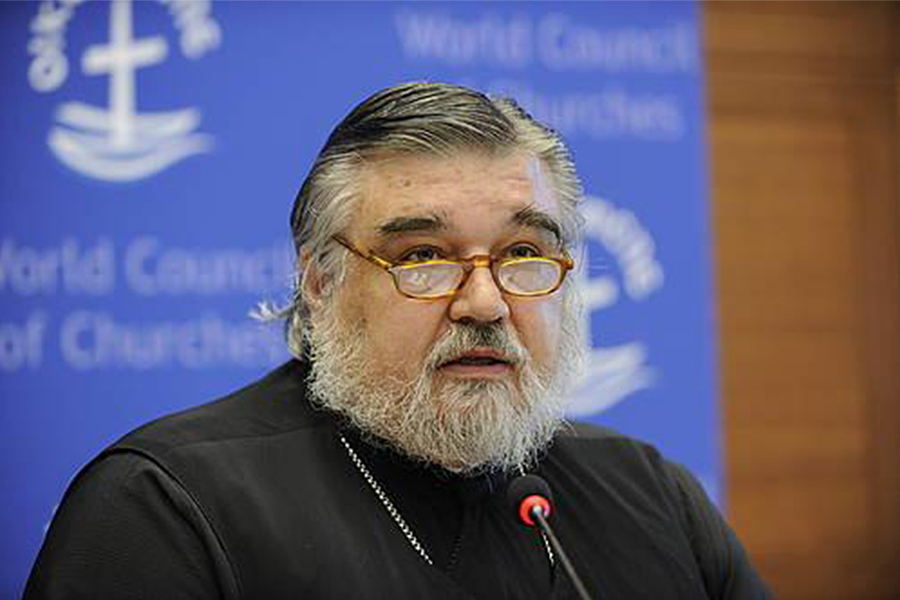Metropolitan Dr Gennadios passes on to glory, leaving a great vacuum in the global ecumenical movement, says CCA General Secretary
 Metropolitan Dr Gennadios of Sassima, vice moderator of the Central Committee of World Council of Churches (WCC), has been one of the towering Christian leaders who greatly contributed to the life and witness of the global ecumenical movement; he was imbued with the spirit of ecumenism throughout his life and his passing will create a vacuum in the worldwide church and the ecumenical movement as a whole, stated Dr Mathews George Chunakara, the General Secretary of the Christian Conference of Asia (CCA).
Metropolitan Dr Gennadios of Sassima, vice moderator of the Central Committee of World Council of Churches (WCC), has been one of the towering Christian leaders who greatly contributed to the life and witness of the global ecumenical movement; he was imbued with the spirit of ecumenism throughout his life and his passing will create a vacuum in the worldwide church and the ecumenical movement as a whole, stated Dr Mathews George Chunakara, the General Secretary of the Christian Conference of Asia (CCA).
Metropolitan Prof. Dr Gennadios passed away on 1 June 2022 in Thessaloniki, Greece. He was 71 years old.
Recollecting Metropolitan Gennadios’ invaluable contributions to the ecclesiastical and global ecumenical movement, the CCA General Secretary said, “Metropolitan Gennadios made a remarkable impact in the Christian world, and he always affirmed the need for strengthening the coherence and ethos of one ecumenical movement; his contributions to church unity will be gratefully remembered by the churches across the world.”
Dr Mathews George Chunakara said that he had fond memories of his close association and working together with Metropolitan Gennadios for over two decades, when Metropolitan Gennadios was initially serving as a member of the governing board and subsequently as Vice Moderator of the Central Committee of WCC.
The CCA General Secretary also recollected the fond memories of his travelling together with Metropolitan Gennadios in different continents, especially to communist countries such as North Korea, Vietnam, and China, to dialogue and meet with government and communist party officials along with the representatives of churches in these three nations, where churches and Christian missions still face difficulties.
“Often perceived as a serious person in his external appearance, Metropolitan Gennadios was pastoral, compassionate, and knowledgeable, as well as skilful in handling complex issues with sensitivity, often easing a tensed situation with a sense of humour. His tenacity in affirming the orthodox faith and tradition was always candid, but everybody could well understand the fact that he embodied and embraced the spirit of ecumenism. He evinced keen interest in the highest goals of ecumenism for which he worked diligently. He had a passion to strengthen, nurture, and promote the ecumenical spirit in the worldwide church through the WCC and other related ecclesiastical bodies over the years of his committed work,” recalled Dr Mathews George Chunakara, who had worked closely with Metropolitan Gennadios during his tenure with the WCC as its Asia Secretary and the Director of International Affairs.
Metropolitan Gennadios served in several capacities at the WCC including the following: a staff member of the WCC’s Faith and Order secretariat in Geneva from 1983 to 1993, a member of the Executive and Central Committees, vice-moderator of the WCC’s Faith and Order Commission, and Vice Moderator of the WCC Central Committee for two consecutive terms, first elected in 2006, and a second term since 2013.
Metropolitan Gennadios was also part of the governing board of the Conference of European Churches, the counterpart of CCA. He was instrumental in facilitating several ecumenical and theological dialogues among various churches and ecclesiastical and confessional bodies, including the Roman Catholic Church.
Known by his original name Prof. Dr Lymouris Nikolaos in the academic field, Metropolitan Gennadios was a professor of Orthodox Theology and Orthodox Canon Law in several universities, including at the Theological School of the University of Strasbourg, the Institute of Ecumenical Studies, “St. Bernardino” of Venice, and Pontificio Ateneo Antonianum University in Rome, Italy. He graduated from the Theological Institute of Saint Sergius in Paris and then pursued postgraduate studies at the University of Strasbourg.
In recognition of his genuine and sincere commitment to peace, dialogue, and Christian witness, he was gifted with an honorary fellowship by the Orthodox Academy of Crete and was conferred two “honoris causa” degrees from the Holy Cross Greek Orthodox School of Theology (Brookline, Massachusetts, USA) and from the University of Athens (Greece) Faculty of Theology in 2010 and 2015, respectively.
The Christian Conference of Asia, together with its member churches and councils, expresses its deepest condolences to the Ecumenical Patriarchate of Constantinople, the World Council of Churches, and to his bereaved family.










